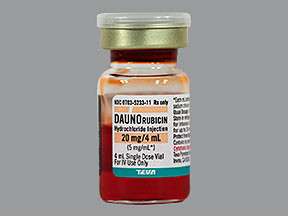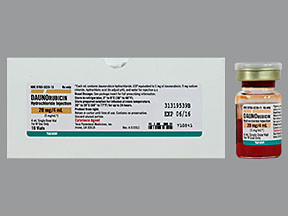DAUNORUBICIN - INJECTION
PHONETIC PRONUNCIATION: (dawn-oh-REWB-eh-sin)
COMMON BRAND NAME(S): Cerubidine
GENERIC NAME(S): daunorubicin HCl
Uses
USES: Daunorubicin is used to treat leukemia and other cancers. It belongs to a class of drugs known as anthracyclines and works by slowing or stopping the growth of cancer cells.
How to use DAUNORUBICIN - INJECTION
HOW TO USE: This medication is given by injection into a vein by a health care professional. Dosage is based on your medical condition, body size, and response to treatment. If this medication touches your skin, immediately wash the area well with soap and water. If this medication gets in your eye, open the eyelids and flush with water for 15 minutes, then seek immediate medical attention. Caregivers should take precautions (e.g., wear gloves) to prevent contact with the patient's urine and other body fluids. Drink plenty of fluids while using this medication unless otherwise directed by your doctor. Doing so helps decrease the risk of certain side effects (e.g., increased uric acid).
Side Effects
Precautions
Interactions
Overdose
Images
Reviews
Faq for DAUNORUBICIN - INJECTION
Daunorubicin injection is used to treat certain types of cancer, including leukemia and other blood disorders.
Daunorubicin injection is given directly into a vein by a healthcare professional.
Common side effects of daunorubicin injection may include nausea, vomiting, hair loss, temporary lowering of blood cell counts, and mouth sores.
The dose of daunorubicin injection will depend on factors such as the type of cancer being treated, body weight, and overall health. It is usually given in multiple cycles with rest periods in between.
If you miss a dose, it is important to contact your healthcare provider as soon as possible for instructions.
Daunorubicin injection should not be used during pregnancy as it may harm the unborn baby. It is also not recommended while breastfeeding as it may pass into breast milk.
Daunorubicin injection may interact with certain medications, including those used to treat infections or other types of cancer. It is important to inform your healthcare provider about all the medications you are taking.
It is important to closely follow your healthcare provider's instructions, attend all scheduled appointments, and report any unusual side effects or symptoms immediately. It is also advisable to avoid exposure to infections and practice good hygiene.
Daunorubicin injection can be used in children, but the dosage and treatment plan may vary depending on the child's age and condition. Pediatric oncologists will determine the most appropriate course of treatment.
Warning
WARNING: Daunorubicin must be given only by injection into a vein. This medication must not be given by injection into a muscle or under the skin. If this medication accidentally leaks into the skin/muscle around the injection site, it may cause severe damage. Tell your doctor right away if you notice redness, pain, or swelling at or near the injection site. This medication may rarely cause serious (rarely fatal) heart problems (including heart failure). This may occur both during treatment or months to years after treatment is completed. The risk of heart problems is affected by your dose, medical history (including previous heart disease, radiation treatment to the chest area), and previous use of this and other drugs (including doxorubicin). Tell your doctor right away if you notice symptoms such as irregular heartbeat, shortness of breath, swelling ankles/feet, unusual tiredness, or unusual/sudden weight gain. Daunorubicin may cause certain severe blood and bone marrow disorders (low red blood cells/white blood cells/platelets). This can affect your body's ability to stop bleeding or fight infection. Tell your doctor right away if you develop easy bleeding/bruising or signs of infection (e.g., fever, chills, persistent sore throat). Very rarely, people with cancer who are treated with this type of medication have developed other cancers (e.g., secondary leukemia). The risk may be increased when this medication is given with certain anti-cancer drugs or radiation treatment. Consult your doctor for more details. Before starting treatment with this medication, tell your doctor if you have liver or kidney problems. Your dose may need to be adjusted.
Disclaimer
IMPORTANT: HOW TO USE THIS INFORMATION: This is a summary and does NOT have all possible information about this product. This information does not assure that this product is safe, effective, or appropriate for you. This information is not individual medical advice and does not substitute for the advice of your health care professional. Always ask your health care professional for complete information about this product and your specific health needs.



No Reviews Yet